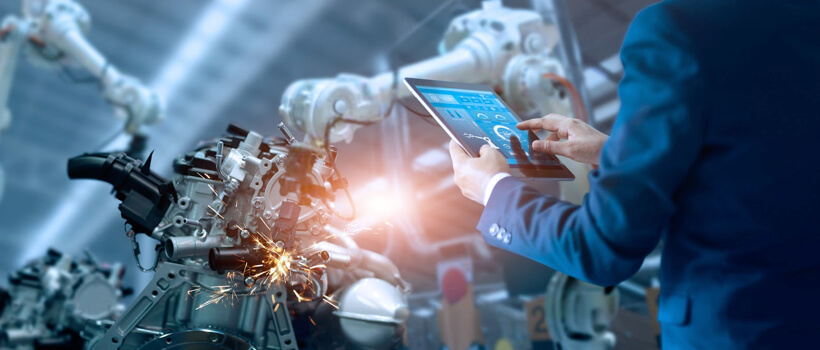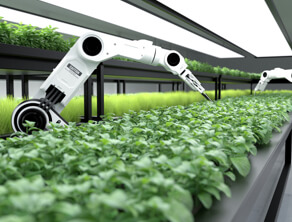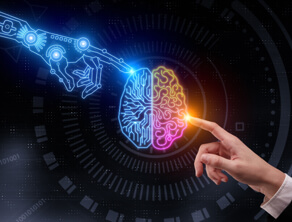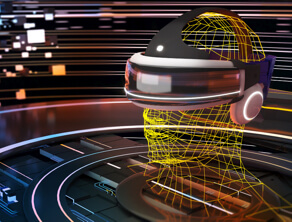How Manufacturing Businesses can Leverage Machine Learning for Improved Automation and Efficiency?
Table of contents
Introduction
Machine Learning and automation has found its niche in almost every vertical, but it’s astonishing to see how the manufacturing industry has been leveraging on ML to increase their overall productivity. The Artificial intelligence market is expected to grow at a CAGR of 57.2% and reach USD 16.7 billion by 2026. When we talk about manufacturing, we’re talking about the maximum output with the minimum possible resource input, but the concept is perilous to a great extent. This challenge faced by the manufacturing industry was cut short with the successful deployment of machine learning into their processes.
By introducing automation through machine learning into their supply chain, tonnes of megacorps have been seeing impressive results with bringing down the labor costs they incur, reducing downtime to increasing workforce productivity. The manufacturing vertical as we know is embracing the fact that a successfully crafted algorithm will not have a day off. Several manufacturing companies that we know have not shied away from putting in great amounts of their resources into research and development of machine learning systems to enhance their overall business operations.
-
Managing the Supply Chain
With the introduction of ML into an overall production cycle, we’re looking at squeezing the production time and delivering the best possible outcome. With the application of Artificial Intelligence and ML, a subset of AI, companies are able to take a deep dive into their overall supply chain and spot the pain points where there’s scope to improve.
A great example of this can be found in how we at [x]cube LABS, collaborated with Mann+Hummel, the leader in developing air and water filtration devices by combining our expertise in Artificial Intelligence and Industrial Internet of Things. By combining sensors and a mobile application, we made their filtration devices smart and gave them the capability to automate their health and status. The developed dashboard enabled Mann+Hummel to get a variety of reports on the devices and helped them understand the ways customers are engaging with their products. Result was a significant reduction in costs and a major increase in sales for Mann+Hummel.
-
New Product Development
For manufacturing, venturing into a new venture requires resources and involves risks. The idea behind every new product development strategy is to be successful and yield the best result. To tackle the challenge, the manufacturing industry has been employing ML to understand the customer’s behaviour and needs, a well formed ML algorithm can tell how a customer behaves and already predict his future course of action, we’re talking a definite way of knowing whether the product in question would work for the market or not. We cannot disagree on how sitting across another human brings inhibitions on how we talk and react when exposed to situations and questions, the most effective way of predicting the one true side of a customer is to understand him in his most organic state, we’re talking about automation of gathering data, but how?
An example could be how our in-house developed product UPSHOT.AI, a customer engagement tool that can be integrated into an already existing application, Web or Mobile and study customer’s behaviour patterns and predict how a customer would behave in different situations. Products like UPSHOT.AI, with a successful track record are especially good at reducing the risks associated with the development of new products, as the insights it provides feed the planning stage for more informed decisions.
-
What is the future?
The growth in the adoption of AI solutions is completely dependent on the growth of manufacturing units. However, in the current situation, manufacturing ecosystems have been disrupted, and thus, the growth of AI solutions will also get affected negatively in such industries. But looking at the other end of the spectrum, given the COVID situation, AI-based solutions could help manufacturers to digitally transform operations (such as autonomous material movement using industrial robots) and make prompt data-driven decisions. In addition, AI can play a crucial role in automating several stages of manufacturing and limit human involvement.
The earlier inhibitions of manufacturers about the capabilities of AI-based solutions in terms of the accuracy of their functioning will take a back seat. However, manufacturers are now increasingly accepting the potential benefits of AI-based solutions and the applications they serve.
-
Conclusion
The manufacturing industry has been the early adopter when it has come to innovative technologies and reaped the benefits as well. The entire industry works on a grand scale so the risk involved is immense. Companies with resources are looking towards finding ways to predict the future as far as their production lines are concerned. Hence, the relevance for deep learning technology is growing, if the forecast is to be believed, deep learning technologies are expected to witness a high surge in demand. Rapid adoption of robotics in the manufacturing industry is one of the major factors that has been driving the demand of AI in the industry.
We’re looking at robots in manufacturing units like in the movies, sounds surreal right? But even the technology experts believe that the path to innovation has been paved. APAC regions were found to be the greatest innovators and risk takers, there are a great number of manufacturing units in China and Japan who are willing to invest more and more on automating their entire manufacturing processes. Not just the customers, but the manufacturers seek consistency and growth and that is what automation assures. The best way to control quality, the maximisation of output, enhanced products and successful supply chain management.
To sum up, let’s take a look at the three essential questions to keep in mind as someone enthusiastic about the potential of ML in manufacturing:
- How is machine learning used in the industry?
Modern manufacturing is incorporating machine learning throughout their production process. The accuracy in prediction that ML provides has helped manufacturing units to predict the market dynamics beforehand. Manufacturing industries have made peace with the fact that ML is the only way for machines to adapt to changing market needs. The benefits of ML surpasses the rate of error with a huge margin which has led to a wider adoption of ML in the manufacturing industry.
- Why is machine learning Important for smarter manufacturing?
Machine learning can enhance every aspect of manufacturing. Manufacturing is a continuous process that goes as far as the maintenance of the product being manufactured. The predictive algorithms, reduction in costs and downtime, computerization of tedious tasks has only led the manufacturing industry to believe that ML is what the future of manufacturing depends on. It has been well recorded that exponential technologies can build robust and rapid manufacturing models. According to a 2019 Global Market Insights report, global machine learning in manufacturing is going to skyrocket from $1 billion in 2018 to $16 billion by 2025.
- What is machine learning in manufacturing?
In the simplest terms, machine learning is the facilitator of identifying key components in a manufacturing process by identifying, monitoring and analyzing the manufacturing processes.
- How is machine learning used in the industry?
![Blog-[x]cube LABS](https://d6fiz9tmzg8gn.cloudfront.net/wp-content/uploads/2016/06/blog_banner.jpg)







